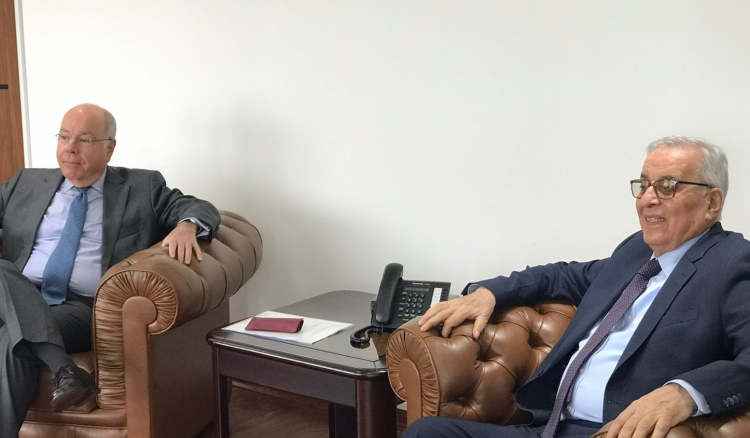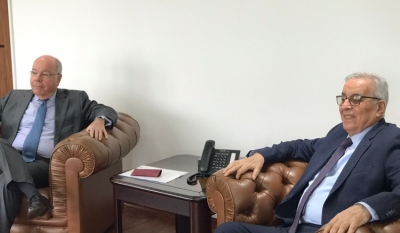Minister of Foreign Affairs and Emigrants in the caretaker government, Abdullah Bou Habib, received his Brazilian counterpart, Mauro Vieira. After the meeting, Bou Habib stated, "Brazil is our second home because we certainly have more Lebanese there than in Lebanon; in São Paulo, we have more Lebanese than we do in Lebanon, which indicates that Brazil is the primary home for Lebanese people around the world. They are successful and contribute to politics, economy, and all aspects of life in Brazil."
He noted, "We welcome the Brazilian minister today for his stance regarding what is happening in Gaza. The minister came to visit Jordan, Ramallah, and Lebanon without passing through Israel, which is an important message Brazil is sending to the world. What is happening in Gaza is unacceptable, with the displacement and killing of the people of Gaza; everything has been destroyed, and it is unacceptable to have famine in the 21st century while the international community cannot provide food for those in need."
He added, "We also welcome Brazil's position regarding UNRWA, which holds great importance as it was established after the failure of the United Nations to impose a two-state solution, having created one state while the others became refugees. Thus, UNRWA was established to assist them. Now, we cannot stop its work until there is a Palestinian state; after that, UNRWA won't be needed, but for now, we need UNRWA in Lebanon, Palestine, Jordan, and also in Syria. If Palestinians in these countries are not supported by UNRWA, they will resort to extremism and pose a real threat not only to us as host countries but also to the entire region and the world. What we want from UNRWA is to provide them with a decent life, and we hope it continues its work."
He continued, "We also discussed the situation in southern Lebanon, and I affirmed to the visiting minister that we are not seeking war and have never thought about it. We want the full implementation of UN Security Council Resolution 1701, which means that Israel has much of our land that must be returned to us, and for both of us to return to the borders set by the British and French in 1923. These borders were ratified by Lebanon and Israel in 1949 under the auspices of the United Nations in Greece. Therefore, what we want is to return to the international borders and restore security and stability to our borders and to southern Lebanon, which has suffered from insecurity and instability since the mid-1960s."
He concluded, "Brazil is a member of the UN Security Council and has a significant influence in Latin America and within the BRICS group, and we know that Brazil stands by us on this matter. I must also say that Brazil has contributed to UNIFIL through 200 personnel."
For his part, the Brazilian minister remarked, "This is my fifth visit to Lebanon; the last time I was here was in 2015 when I was Prime Minister at that time, where I visited the Brazilian forces operating in the south, which Brazil supports and will continue to support. However, this time, despite my short visit, I met with the Speaker of the Parliament, the Prime Minister, and the Lebanese Foreign Minister and will meet with UNIFIL."
He added, "My meeting today discussed Brazil's support for the implementation of Resolution 1701. Although we are no longer a member of the Security Council, we work with other countries to support stability along the Lebanese border." He continued, "We also discussed what is happening in Gaza, and I informed the Lebanese Foreign Minister that we support the two-state solution. During our presidency of the Security Council last year, we worked hard to try to reach a resolution to achieve at least a temporary ceasefire, release all Israeli prisoners, ensure humanitarian aid to Gaza, and protect civilians in Gaza. Unfortunately, our proposed resolution was not approved, and one country cast a veto against it, while 12 countries expressed their approval at a time when 3,000 had already been killed due to the conflict."




